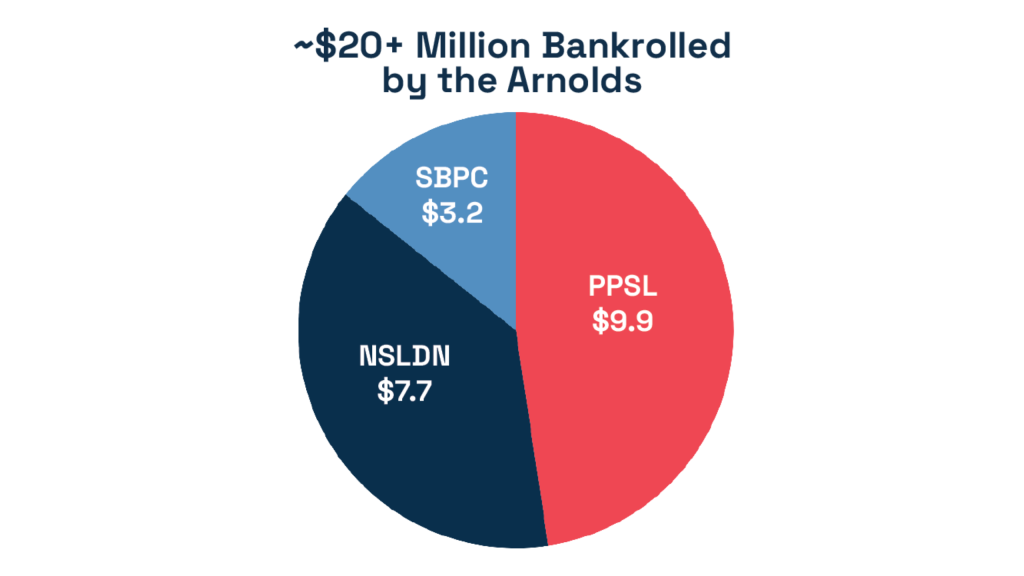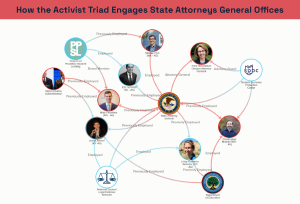
As explained above, beginning in late 2018 the Arnold Foundation started funneling significant funding into the three legal and policy advocacy organizations with strong connections to the Biden Department of Education—SBPC, PPSL, and Student Defense.
Around this time, the John & Laura Arnold Foundation, “Arnold Ventures,” the leading foundation supporter of anti-business advocacy in education, started investing heavily and bankrolling new legal advocacy organizations that weaponize lawsuits and state law enforcement in their advocacy campaigns.
Since 2018, Arnold Ventures has given more than $20 million to these education litigators. The multi-million-dollar effort led to the creation of new education-focused legal advocacy groups. Ardent career college opponent David Halperin recalls that the groups didn’t have the legal capability at the time, but the new funding was a game changer.
The millions invested in these groups have led to significant increases in lawsuits targeting education businesses. The organizations have been leading advocates for pursuing student loan positions, including wiping away student loan debt for individuals making more than six figures, which cost taxpayers billions and making education less affordable for students and families who have previously paid their debts.
Even before the Biden Administration’s student loan cancellation plan was thwarted by the U.S. Supreme Court, the Department of Education realized that it would need political cover to muscle through its goal. Accordingly, it enlisted its proxies—the purportedly independent student advocacy groups noted above—to gin up political cover.
Here is how they launched a concerted campaign of “lawfare”:
PROMULGATING A WAVE OF LAWSUITS AT THE EXPENSE OF TRADITIONAL ED DEPARTMENT RESPONSIBILITIES, LIKE FAFSA
Equipped with the deep pocketbooks of the Arnold Foundation, the Department of Education’s proxies quickly realized they had an advantage over their targets—the financial means to engage in protracted court battles. Unlike defendants, these supposed student advocacy organization’s measures of success were not the legal outcomes, but rather public opinion outcomes. By discrediting these schools and vendors, the organizations provided the Department with legitimacy to cancel the loans of students allegedly defrauded by these nefarious actors.
It’s quite simple: Ignore the malfeasance and wrongdoing of conventional college and universities, sue “predatory,” “for-profit” colleges, and beat the legal tar out of other education businesses. AEI scholar Michel Brickman concisely summarized the Biden Administration’s strategy to target private-sector vendors in five simple steps: (1) Identify a target, (2) Raise ‘concerns,’ (3) Target suffers from accusations, (4) Government increases regulation, (5) Self-fulfilling prophecy hampers innovation and harms students.
In 2017, coinciding with the Arnold Foundation’s influx of funding, these organizations initiated this concerted “lawfare” strategy.
Between 2017 and 2022, PPSL and Student Defense filed no fewer than thirty new cases. Almost all these lawsuits were filed directly against high education companies, and most were filed against career colleges and private service providers. Some of the litigation, such as the PPSL-led Sweet v. Cardona, have had a profound impact on education choice.
The third organization, SBPC, focused its attention on state law enforcement, which it sought to recruit to build “grassroots” opposition against education businesses. SBPC’s efforts included fraternizing with state public officials, dictating meeting agendas, and even scrutinizing dinner menus at a conference.
The Department of Education’s laser focus on selectively targeting career colleges and higher education businesses has come at the expense of the Department’s one responsibility—serving students. As noted above, President Biden’s 2024 budget included a 600 percent increase in funding for the Federal Student Aid Office of Enforcement. Likewise, the Department of Education’s 2025 budget request seeks an additional $56 million from taxpayers to “hire sufficient staff to satisfy the Department’s legal obligations in the Sweet v. Cardona settlement”—clearly signaling the Administration’s doubling down on its lawfare strategy.
Meanwhile, the Department’s lawfare campaign has diverted resources away from important priorities. Under director Richard Cordray, the Federal Student Aid’s (FSA) botched rollout of the Free Application for Student Federal Aid (FAFSA) has created uncertainty for millions of prospective college students. As of early May 2024, only 36 percent of high school seniors had completed the application, down 24 percent from last year. About 700,000 fewer students are expected to submit a FAFSA this year, which could cause a four percent drop in college enrollment next fall. Those most affected are minority and lower-income families and first-generation college-goes, who are more reliant on financial aid.
CONDUCTING “EXPERIMENTS” TO FIND EVIDENCE WHERE IT DIDN’T EXIST BEFORE
State Attorneys General are influential offices. As such, many advocacy groups have sought to curry favor with these officials to affect policy. However, few have been as successful as the network of third-party education activists recruited by the Biden Administration.
Serving as extensions of the Department of Education, the groups have effectively armed government employees—paid for by taxpayers—to initiate complaints where none existed previously. In other words, because they lacked have the evidence to harass successful education businesses, these organizations aimed instead to direct government employees to find it—a process the Oregon Attorney General called “our own experiment.”
AAF’s research revealed, for example, that SBPC fostered relationships with at least 19 attorney general (AG) offices, which it leveraged to drive legal actions against education businesses. This is according to thousands of pages of internal records obtained through state open records laws that were submitted over the last three months. Below are a few of the partnerships with AGs that are significant. In direct response to an email directed by SBPC to its state law enforcement list, Oregon Attorney General Ellen Rosenbaum moved her team into action against private loan servicers:
“Can you remind me when the loan servicers who do business in Oregon need to be licensed by?… Is there an easy way to check to see which ones are licensed? We might want to consider announcing that list on October 1 so that we can flag any that are not. (ask people to let us know if their LS is not on the list!) ….Can you find out how many complaints the Ombuds ( Laynie?) is getting and what they are mostly concerning. Are they similar to those in the SBPC email? Idea: We could do our own experiment and ask people to call their LS and ask them to let us know how long it took them to get through. When they did get through, were their servicers helpful?”65 [sic]
As the following section demonstrates, leaders of these advocacy groups have ingratiated themselves with state leaders to the point of buying drinks for them ahead of conferences and providing input into meeting agendas—activities that, at the very least, resemble lobbying efforts and potentially violate ethical conduct rules. AAF found no evidence that these activities were publicly disclosed.
HOW ACTIVISTS TRAIN GOVERNMENT LAWYERS TO ADVANCE THEIR LIBERAL AGENDA
This is an inside look at how an activist group drove an agenda with AGs, specifically the development of speakers and topics at the third Student Debt Symposium, an event cosponsored by SBPC and Oregon Attorney General Ellen Rosenblum, who is also an SBPC Advisory Board Member. State records show that the event appears to have been organized by the Oregon Attorney General, but in fact it was SPBC’s show – from the agenda and speakers, to buying drinks for key staff the night before. Even when a top official at the Oregon Department of Justice raised concerns about the partisan nature of the agenda, it was ignored.

What was advertised as the Oregon Attorney General Ellen Rosenbaum’s third Student Debt Symposium was actually a recruiting event for SBPC, whose members drove the agenda, picked speakers and handled logistics for the event. The symposium was on July 19-20, 2023.
On June 12, Mike Pierce sent a list of speakers to Ms. Rosenblum and the Oregon Attorney General’s staff. An AG representatives asked whether the agenda was finalized so they could send it to the potential participants. Ellen Klem, Director of Consumer Outreach and Education for the Oregon AG, responded that she was “hoping to send a final agenda to our designer by Friday so she can make it look professional for printing and distribution at the event.” Email communications show that Mike Pierce, SBPC executive director, and his team picked the roster of speakers
Ms. Rosenblum to approve and those were finalized with virtually no changes.
The evening of July 18, the night before the student loan symposium, Mr. Pierce invited key Oregon AG staff for a drink at Level Brewery. Pierce wrote in an email that SBPC representatives expected to stay at the brewery for several hours.
In records obtained by AAF that include a list of speakers and registered attendees, there were no participants to provide balanced perspectives, such as experts with contrary opinions or industry representatives.
The Student Loan Symposium was off-the-record and there were no recordings from or documentation of it. However, the Oregon AG office made exceptions for select individuals to participate remotely: Christopher Madaio, the head of enforcement for the Department of Education’s Student Financial Aid Office, in a series of emails, secure “private access” for Nina Schichor and Kristen Donoghue, two senior officials at the Department of Education’s Office of Enforcement. Both had close ties to Richard Cordray, director of Student Financial Aid and worked for him at the CFPB.
The Oregon Attorney General Ellen Rosenbaum wasn’t involved on a daily basis in organizing the symposium but would weigh in on certain items, including the quality of the dinner for the keynote speech. AG Rosenbaum emailed an aide early in July: “I think we should ‘upgrade’ the reception / dinner plans a bit.”
In response, the aide stated that they were already paying $37/person and specifically asked Rosenbaum, “how you would like to see the dinner upgraded?” Open records provided to AAF didn’t have a response to the simple question.
In early July, Ellen Klem, an aide to Ms. Rosenbaum, sent a note to Mike Pierce and other SBPC aides noting Ms. Rosenbaum’s concern “that the current agenda does not include enough of a balance and she will face criticism for hosting a one-sided, Demonly, event.” Little occurred in response to this email.70 Nothing appeared to change.